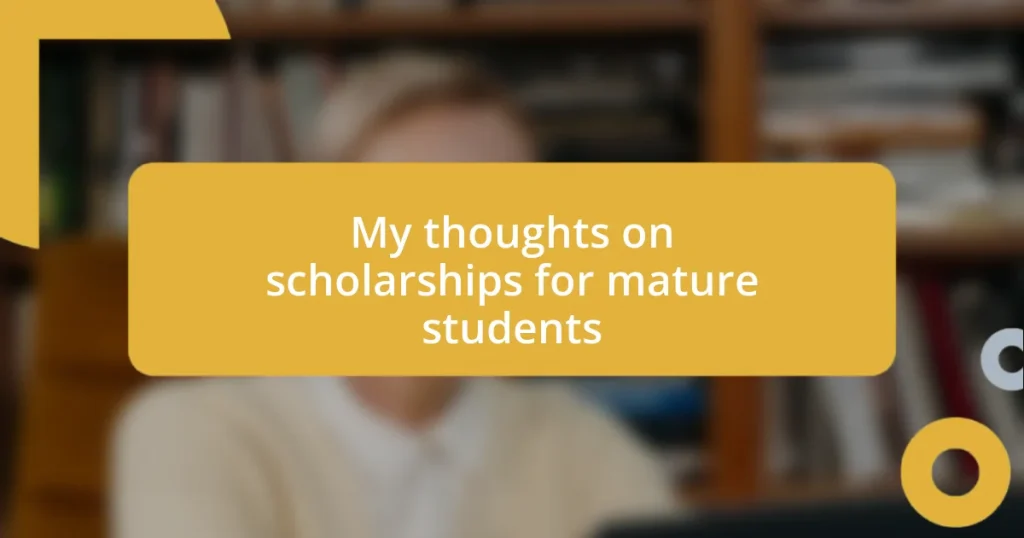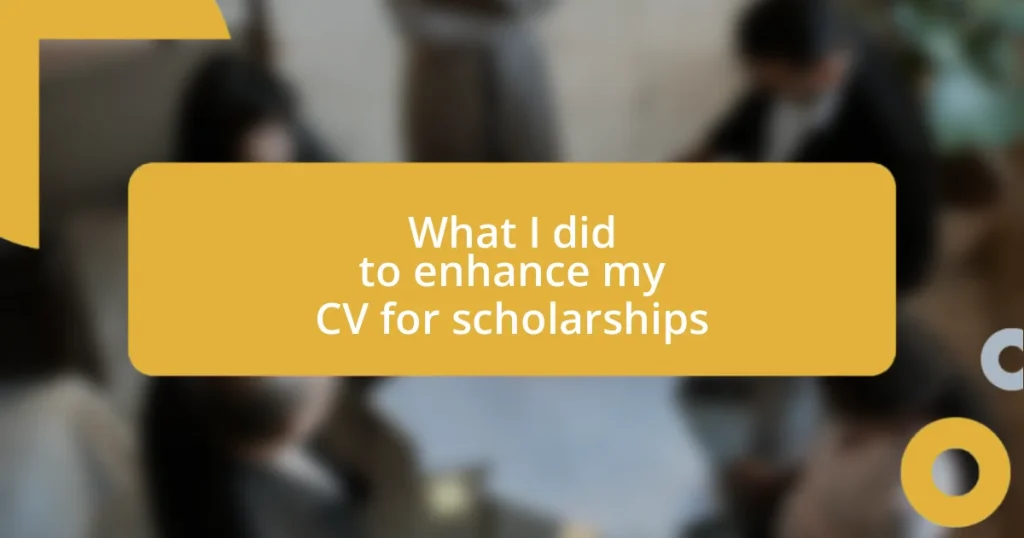Key takeaways:
- Scholarships for mature students are numerous and can validate personal experiences and aspirations, making education more accessible.
- Key types of scholarships include merit-based, need-based, career advancement, community service, and subject-specific scholarships, each catering to unique needs and backgrounds.
- Utilizing resources such as scholarship search engines, local organizations, and university financial aid offices can significantly enhance the search for suitable scholarship opportunities.
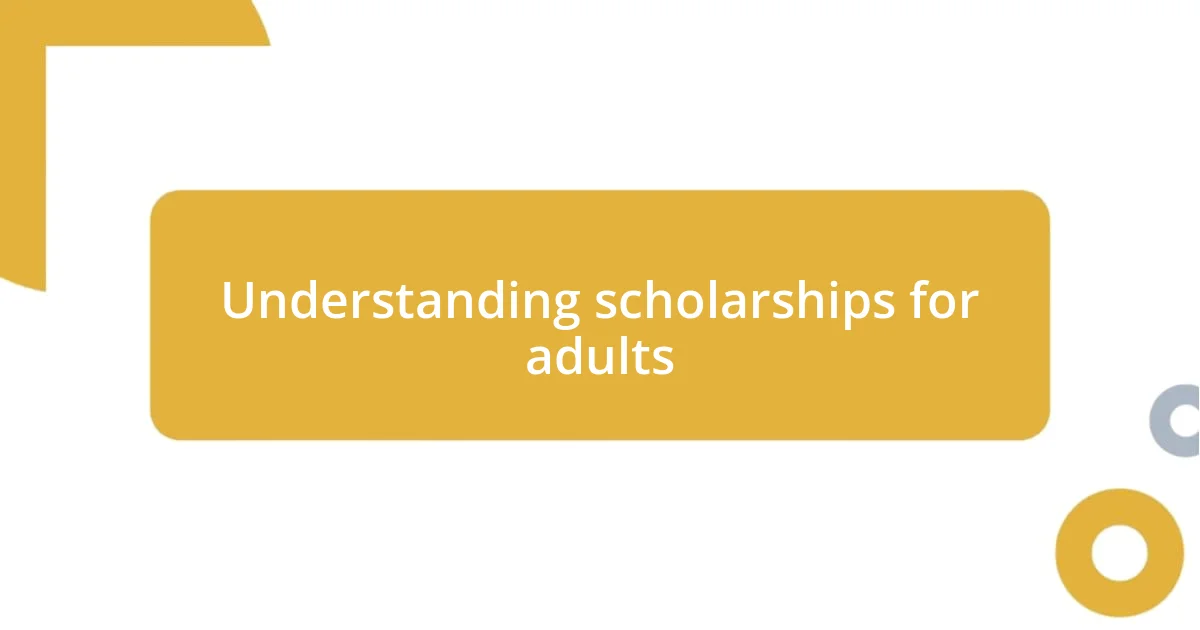
Understanding scholarships for adults
Scholarships for adults are designed to break down the financial barriers that can make returning to school feel overwhelming. When I first considered going back to college, I was surprised to find out just how many scholarships catered specifically to mature students. It’s like a hidden treasure trove waiting to be discovered—have you ever thought about what opportunities might be out there for you?
One of the most rewarding experiences I had was applying for a scholarship aimed at professionals seeking career advancement. I remember the flood of emotions I felt while pouring my heart into the application, reflecting on my journey and aspirations. It made me realize that these scholarships not only provide financial support, but they also validate our experiences and dreams at a time when we might doubt ourselves.
Navigating the world of adult scholarships can seem daunting at first, especially with the variety of options available. But I encourage you to dig deep into what each scholarship requires—sometimes, it’s more about sharing your story than meeting rigid qualifications. Have you ever wondered how your life experiences can work in your favor during the application process? You might find that your unique perspective is exactly what scholarship committees are looking for.
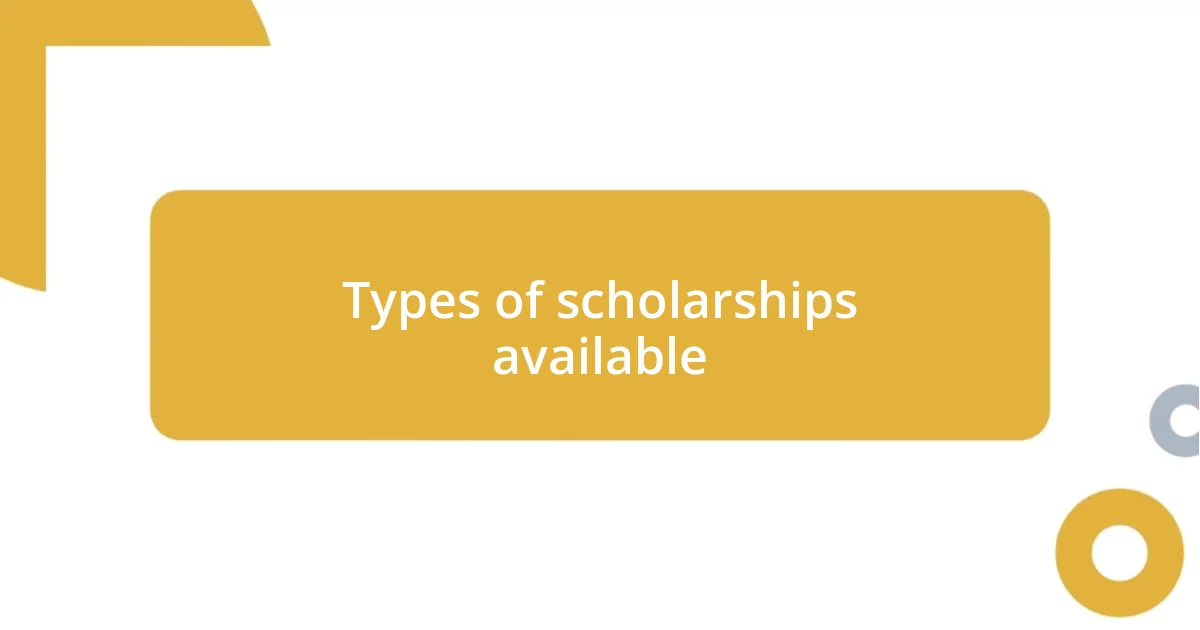
Types of scholarships available
When I was navigating the scholarship landscape, I discovered a multitude of types designed to fit various needs and backgrounds. Each one serves a unique purpose, tailored for individuals like us who are eager to enrich our education. Just knowing that these options exist makes the journey feel a bit less intimidating.
Here’s a snapshot of some common types of scholarships available for mature students:
- Merit-Based Scholarships: Granted for academic excellence, showcasing your hard-earned achievements.
- Need-Based Scholarships: Offered to students demonstrating financial hardship, helping to cover tuition costs.
- Career Advancement Scholarships: Targeted at working professionals looking to upgrade their skills or pivot in their careers.
- Community Service Scholarships: Rewarding individuals who have made significant contributions to their communities, showing how your past can pay off.
- Subject-Specific Scholarships: Focused on a particular field of study, encouraging individuals to pursue passions in areas like healthcare, education, or technology.
When I came across a community service scholarship, it resonated with me deeply. Volunteering had always been a core part of my life, and I never thought it would lead to financial support for my education. It felt like a validation of my efforts, making me believe that my contributions to society did hold value in the academic world. This connection between personal experiences and scholarship opportunities can transform not just our education, but how we view ourselves in the broader narrative of lifelong learning.
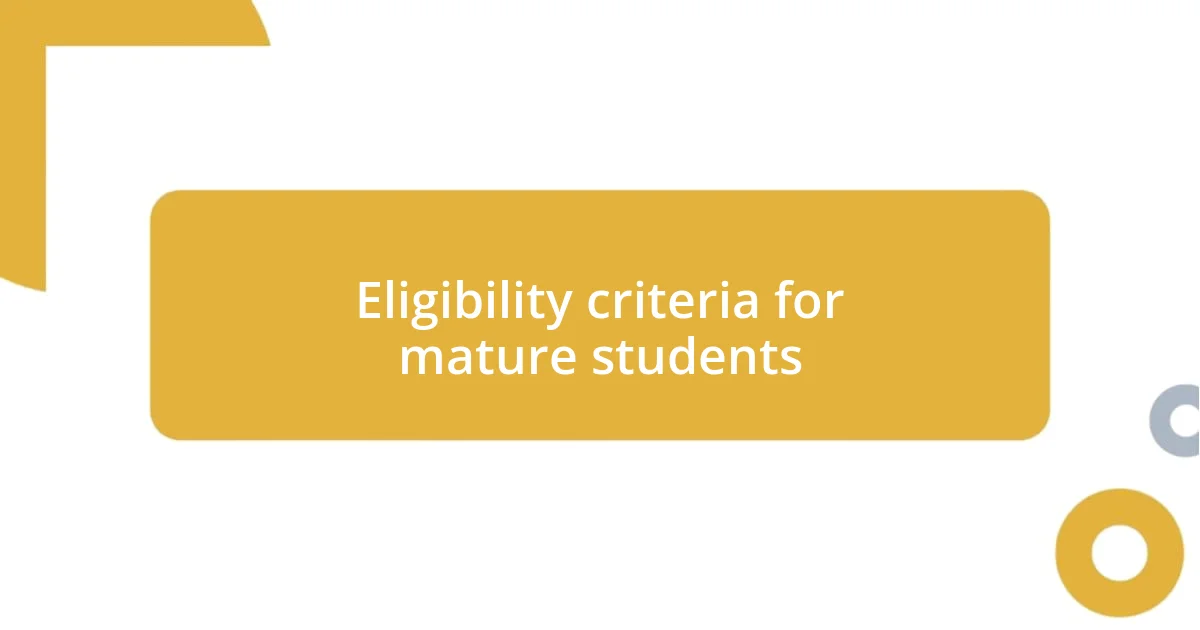
Eligibility criteria for mature students
When considering eligibility criteria for mature students, it’s essential to understand that most scholarships don’t hinge solely on age but instead focus on the unique experiences that adults bring to the table. For example, in my case, returning to school meant overcoming significant life challenges, which resonated well with scholarship committees when I highlighted them. They often seek stories that showcase resilience and personal growth, which can be far more compelling than traditional academic achievements.
Many scholarships require applicants to demonstrate prior work experience or a commitment to community service, factors that often set mature students apart. Reflecting on my own journey, I realized that my professional background and volunteer work were just as important as my grades. In fact, emphasizing these elements made my application stand out more, revealing a depth of character and dedication that younger applicants might not showcase.
Eligibility criteria can vary widely, so it’s crucial to research specific scholarships tailored to your interests. Some might ask for a personal essay or letters of recommendation, allowing you to express how your life experiences have shaped your educational goals. I remember pouring my emotions into my scholarship essays; those moments of introspection not only clarified my ambitions but helped me connect with the reviewers on a personal level.
| Criteria | Description |
|---|---|
| Age Requirement | Typically 25 years and older, although this can vary. |
| Work Experience | Demonstrated work history or relevant professional background. |
| Community Involvement | Commitment to volunteer work or service in your community. |
| Academic Record | Previous education may be assessed, but life experience often holds weight. |

How to find scholarship opportunities
Finding scholarship opportunities can feel like searching for a needle in a haystack, but it doesn’t have to be overwhelming. I remember my first steps in this process felt daunting, yet I quickly learned that targeted research is key. Online platforms like scholarship search engines can filter options based on my age, field of study, or even my unique experiences, which helped focus my search.
Networking is also an invaluable strategy. I often connected with alumni from programs I was interested in or attended workshops and information sessions. These interactions not only broadened my understanding but frequently led to recommendations for lesser-known scholarships. Have you ever thought about how a simple conversation could lead to financial support for your education? It’s amazing how sharing your journey can uncover pathways to opportunities you might not find otherwise.
Lastly, don’t underestimate local resources. Many community organizations, businesses, and non-profits offer scholarships specifically for residents or members. In my case, I stumbled upon a scholarship through a local nonprofit I volunteered with, which was a gratifying surprise. Engaging with your community can yield not just monetary benefits but also a sense of belonging and fulfillment as you pursue your educational goals.
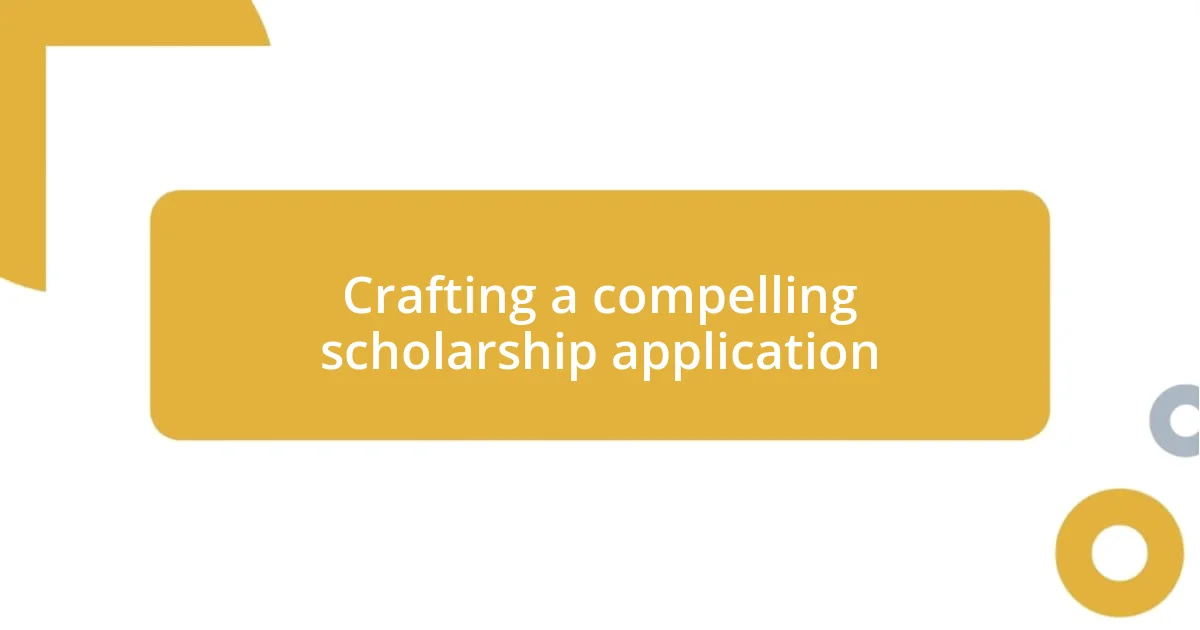
Crafting a compelling scholarship application
Crafting a compelling scholarship application begins with storytelling. I found that weaving my personal journey into my essays was incredibly effective. For example, I shared a moment from my past when I juggled work, family, and school, which revealed my determination and resilience. This narrative didn’t just highlight challenges; it illustrated my commitment to pursuing education despite obstacles, allowing reviewers to see the person behind the application.
It’s crucial to tailor each section of your application to resonate with the specific scholarship’s mission. I vividly remember customizing my language and focus based on the values expressed in the scholarship guidelines. I showcased how my goals aligned perfectly with their vision, reflecting both my passion and the impact I hoped to make in my community. Have you thought about how your experiences might reflect the values of the scholarship you’re applying for? This alignment can make a significant difference.
Finally, don’t shy away from seeking feedback before submission. I recall feeling uncertain about my application, so I reached out to a mentor. Her insights not only improved my essay but also boosted my confidence. Getting a fresh perspective can highlight strengths you may overlook. Ideally, your application should resonate as a cohesive whole, clearly articulating who you are and what you aim to achieve. Remember, every application is an opportunity to convey your unique story and vision, so unleash your authentic self!
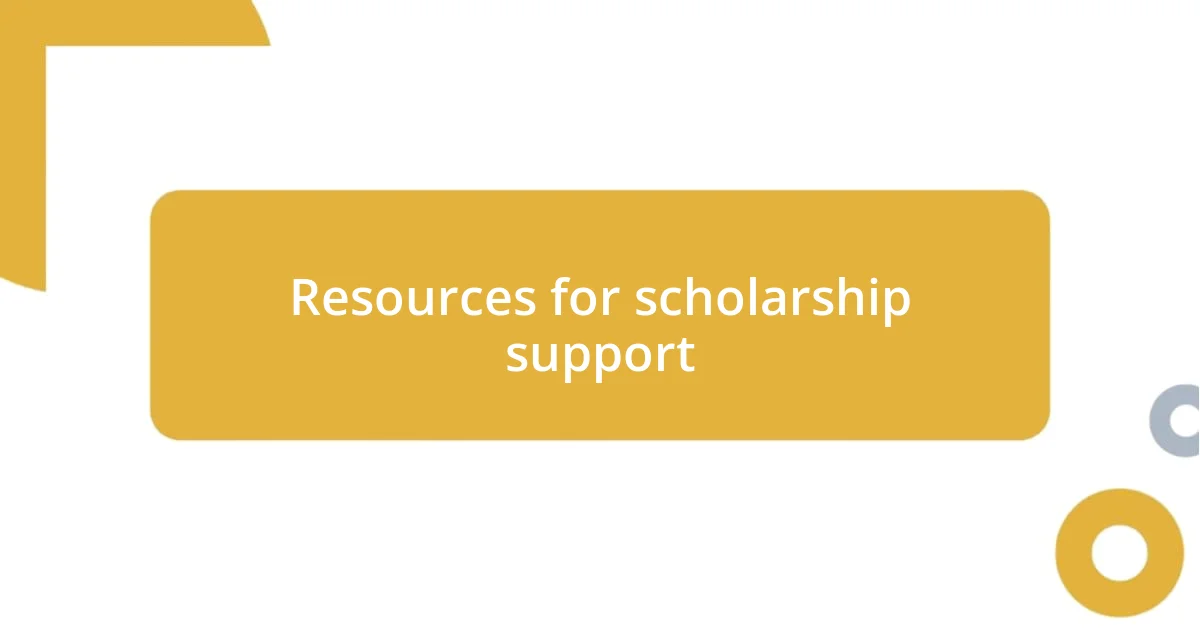
Resources for scholarship support
When searching for scholarship support, online resources can be a goldmine. I found that websites like Fastweb and Cappex not only list opportunities but also provide tools to help students track deadlines and tailor applications. Have you ever been overwhelmed by seeing dozens of options? I certainly felt that way, but these platforms made it manageable and even enjoyable as I discovered new possibilities.
University financial aid offices are another often-overlooked resource. I vividly remember walking into mine, slightly nervous but curious. The staff was incredibly helpful, offering personalized advice that addressed my specific situation as a mature student. Their insights into institutional scholarships and grants that I wouldn’t have otherwise known about opened doors that felt like a distant dream. It’s worth asking the right questions and utilizing these resources to maximize your chances.
Lastly, consider online forums and social media groups dedicated to scholarships. Joining a Facebook group oriented towards mature students or educational funding can be enlightening. I once shared a post in such a group and instantly received feedback and leads on scholarships tailored for my background. The sense of community was uplifting, reminding me that I wasn’t alone in this journey. Have you explored such spaces? Engaging with others can turn what feels like a solitary trek into a rewarding collective experience.










